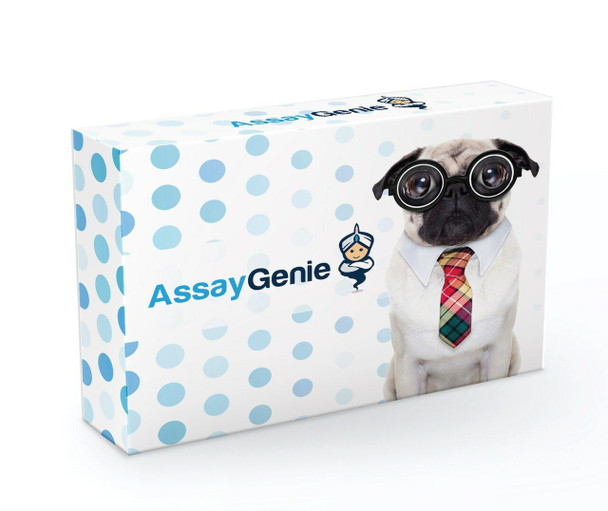Anti-BCAR3 Antibody (CAB18395)
- SKU:
- CAB18395
- Product type:
- Antibody
- Reactivity:
- Human
- Host Species:
- Rabbit
- Isotype:
- IgG
Frequently bought together:
Description
| 抗体名: | Anti-BCAR3 Antibody |
| 抗体コード: | CAB18395 |
| 抗体サイズ: | 20uL, 50uL, 100uL |
| 申し込み: | WB |
| 反応性: | Human |
| 宿主種: | Rabbit |
| 免疫原: | Recombinant protein of human BCAR3. |
| 申し込み: | WB |
| 推奨希釈: | WB 1:500 - 1:2000 |
| 反応性: | Human |
| ポジティブサンプル: |
| 免疫原: | Recombinant protein of human BCAR3. |
| 精製方法: | Affinity purification |
| ストレージバッファ: | Store at -20°C. Avoid freeze / thaw cycles. Buffer: PBS with 0.02% sodium azide, 50% glycerol, pH7.3. |
| アイソタイプ: | IgG |
| 順序: | Email for sequence |
| 遺伝子ID: | 8412 |
| Uniprot: | O75815 |
| セルラーロケーション: | |
| 計算された分子量: | |
| 観察された分子量: | Refer to figures |
| 同義語: | NSP2, SH2D3B, BCAR3 |
| バックグラウンド: |
| UniProt Protein Function: | BCAR3: a ubiquitously expressed regulator of R-Ras activity that has been implicated in breast cancer. A GDP exchange factor whose overexpression confers antiestrogen resistance, activates Rac, PAK1, and the cyclin D1. Can accelerate the degradation of IRS-1, thus regulating signaling through the insulin receptor. When overexpressed, it confers anti-estrogen resistance in breast cancer cell lines. May also be regulated by cellular adhesion to extracellular matrix proteins. Up-regulated by interleukin-1-alpha and TNF-beta in thymus cortical reticular cell lines (mouse).Two alternatively spliced human isoforms have been described. |
| UniProt Protein Details: | Protein type:GEFs; Adaptor/scaffold; Motility/polarity/chemotaxis; GEFs, Ras Chromosomal Location of Human Ortholog: 1p22.1 Cellular Component: intracellular Molecular Function:guanyl-nucleotide exchange factor activity; protein binding Biological Process: lens morphogenesis in camera-type eye; positive regulation of GTPase activity; positive regulation of peptidyl-serine phosphorylation; response to drug; signal transduction; small GTPase mediated signal transduction |
| NCBI Summary: | Breast tumors are initially dependent on estrogens for growth and progression and can be inhibited by anti-estrogens such as tamoxifen. However, breast cancers progress to become anti-estrogen resistant. Breast cancer anti-estrogen resistance gene 3 was identified in the search for genes involved in the development of estrogen resistance. The gene encodes a component of intracellular signal transduction that causes estrogen-independent proliferation in human breast cancer cells. The protein contains a putative src homology 2 (SH2) domain, a hall mark of cellular tyrosine kinase signaling molecules, and is partly homologous to the cell division cycle protein CDC48. Multiple transcript variants encoding different isoforms have been found for this gene. [provided by RefSeq, May 2012] |
| UniProt Code: | O75815 |
| NCBI GenInfo Identifier: | 74739634 |
| NCBI Gene ID: | 8412 |
| NCBI Accession: | O75815.1 |
| UniProt Secondary Accession: | O75815,Q5TEW3, Q6UW40, Q9BR50, D3DT43, |
| UniProt Related Accession: | O75815 |
| Molecular Weight: | 82,357 Da |
| NCBI Full Name: | Breast cancer anti-estrogen resistance protein 3 |
| NCBI Synonym Full Names: | breast cancer anti-estrogen resistance 3 |
| NCBI Official Symbol: | BCAR3 |
| NCBI Official Synonym Symbols: | NSP2; SH2D3B |
| NCBI Protein Information: | breast cancer anti-estrogen resistance protein 3 |
| UniProt Protein Name: | Breast cancer anti-estrogen resistance protein 3 |
| UniProt Synonym Protein Names: | Novel SH2-containing protein 2; SH2 domain-containing protein 3B |
| Protein Family: | Breast cancer anti-estrogen resistance protein |
| UniProt Gene Name: | BCAR3 |
| UniProt Entry Name: | BCAR3_HUMAN |

